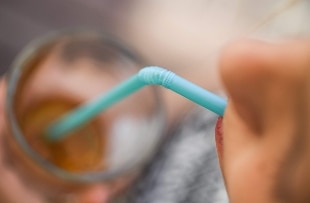- A book in exchange for a plastic waste
- Canada prohibits disposable plastic
- Cefalù, beached sperm whale. Greenpeace: lots of plastic in the stomach
- The Fair Plastic Alliance is born, an international network for sustainable recycling of plastics
Share
June 16, 2019 Little more than a year. By 2021 disposable plastics will be banned in the European Union, to curb an invasion that is destroying the environment, starting from the seas. Today is a new appeal from Environment Minister Sergio Costa, who on the blog of the Stars urges everyone to work hard to prevent this being remembered as the 'Plasticocene' era. But what does the EU directive provide?By 2021, member states must prohibit the use of a series of disposable plastic items: disposable plastic cutlery (forks, knives, spoons and chopsticks), disposable plastic plates, plastic straws, cotton buds made of plastic, the plastic sticks for balloons, the oxy-degradable plastics and the food containers and cups in expanded polystyrene.
Furthermore, according to the directive, by 2029 Member States will have to collect 90% of plastic bottles through waste sorting. The legislation also provides that by 2025 plastic bottles must contain at least 25% of recycled content, to go to 30% by 2030. The directive reinforces the application of the "polluter pays" principle, in particular for the sector of tobacco, introducing an extended responsibility for producers in the collection and recycling of cigarette butts. This new regime will also apply to fishing gear, to ensure that producers, not fishermen, bear the costs of collecting nets lost at sea.
Finally the directive introduces the obligation of informative labeling on the environmental impact of dispersing cigarettes on the street with plastic filters and other products such as plastic cups, wet wipes and sanitary napkins.
According to a Commission study, over 80% of marine litter is plastic. The products covered by the directive account for 70% of all marine litter. The text was adopted with 560 votes in favor, 35 against and 28 abstentions. In particular, glasses that are often found on the beach represent around 20% of marine litter. Only in Italy between 16 and 20 million are consumed per day.
A picture confirmed by the last Legambiente survey on waste found on beaches: pieces and fragments of plastic or polystyrene represent the first category of waste most present on Italian beaches, 21.3%. Plastic caps and lids for drinks are in second place and represent 9.6% of the waste found. This is followed by cigarette butts with 8% and cotton buds with 7.4%. Instead, plastic bottles and containers for beverages make up 4.6% of the total; glasses, straws, cutlery and disposable plastic plates, with 3.5%, are in eighth place.
But the phenomenon is much wider, and has colossal dimensions: 396 million, according to WWF data, the tons of virgin plastic that are produced on a global scale each year, about 100 million tons (equal to one third of the plastic waste produced, which amount to 310 million tons) are those that are dispersed in nature in the world because of the incorrect management of the plastic supply chain (from production, to consumption, to recycling, to disposal). If the context remains unchanged by 2030, the plastic pollution will double compared to the current one and the oceans will be the most affected habitats since today it is cheaper to discharge the plastic in nature rather than to manage it effectively until the end of its life.
But on the EU directive there are also those who turn a nose: according to PlasticsEurope Italia, the Federchimica Association which represents the producers of plastic materials, constitutes a damage to the Italian industry. "The numbers of turnover (direct 1000 million euros, indirect 2300 million euros) and employees (2000 direct and 8500 indirect) - the producers claim - are far from negligible and demonstrate the absolute excellence of this Italian sector in the European panorama ".

